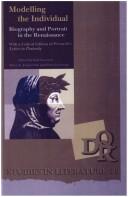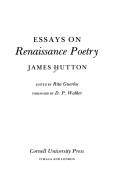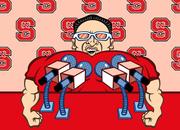| Listing 1 - 10 of 252 | << page >> |
Sort by
|
Book
Year: 2020 Publisher: Firenze, Italy : Firenze University Press,
Abstract | Keywords | Export | Availability | Bookmark
 Loading...
Loading...Choose an application
- Reference Manager
- EndNote
- RefWorks (Direct export to RefWorks)
At the height of its development and up to the eighteenth century, the Spanish classical theatre significantly contributed to the formation of the modern European theatre. Theatre texts and theatrical companies were in fact circulating outside the Iberian peninsula and the Spanish experience of theatre triggered literary debates and reflections that played a central role to the cultural history of Europe, from Neoclassicism to the beginnings of Romanticism. It is a complex phenomenon crossing linguistically and culturally diversified territories, and which therefore needs an inter- and multidisciplinary approach. We tried to respond to this need by involving scholars and researchers in the fields of Hispanic, French, Italian, history of entertainment and musicology for the drafting of this volume.
Book
Year: 2020 Publisher: Firenze, Italy : Firenze University Press,
Abstract | Keywords | Export | Availability | Bookmark
 Loading...
Loading...Choose an application
- Reference Manager
- EndNote
- RefWorks (Direct export to RefWorks)
At the height of its development and up to the eighteenth century, the Spanish classical theatre significantly contributed to the formation of the modern European theatre. Theatre texts and theatrical companies were in fact circulating outside the Iberian peninsula and the Spanish experience of theatre triggered literary debates and reflections that played a central role to the cultural history of Europe, from Neoclassicism to the beginnings of Romanticism. It is a complex phenomenon crossing linguistically and culturally diversified territories, and which therefore needs an inter- and multidisciplinary approach. We tried to respond to this need by involving scholars and researchers in the fields of Hispanic, French, Italian, history of entertainment and musicology for the drafting of this volume.
Book
Year: 2020 Publisher: Firenze, Italy : Firenze University Press,
Abstract | Keywords | Export | Availability | Bookmark
 Loading...
Loading...Choose an application
- Reference Manager
- EndNote
- RefWorks (Direct export to RefWorks)
At the height of its development and up to the eighteenth century, the Spanish classical theatre significantly contributed to the formation of the modern European theatre. Theatre texts and theatrical companies were in fact circulating outside the Iberian peninsula and the Spanish experience of theatre triggered literary debates and reflections that played a central role to the cultural history of Europe, from Neoclassicism to the beginnings of Romanticism. It is a complex phenomenon crossing linguistically and culturally diversified territories, and which therefore needs an inter- and multidisciplinary approach. We tried to respond to this need by involving scholars and researchers in the fields of Hispanic, French, Italian, history of entertainment and musicology for the drafting of this volume.

ISBN: 080142562X Year: 1995 Publisher: Ithaca ; London Cornell University Press
Abstract | Keywords | Export | Availability | Bookmark
 Loading...
Loading...Choose an application
- Reference Manager
- EndNote
- RefWorks (Direct export to RefWorks)
Book
Year: 1968 Publisher: Chicago, IL : University of Chicago Press,
Abstract | Keywords | Export | Availability | Bookmark
 Loading...
Loading...Choose an application
- Reference Manager
- EndNote
- RefWorks (Direct export to RefWorks)
EUROPEAN LITERATURE --- ROMANTICISM --- RENAISSANCE, 1450-1600 --- HISTORY --- EUROPEAN LITERATURE --- ROMANTICISM --- RENAISSANCE, 1450-1600 --- HISTORY

ISBN: 9789004484221 9789042007925 Year: 1998 Publisher: Leiden; Boston : BRILL
Abstract | Keywords | Export | Availability | Bookmark
 Loading...
Loading...Choose an application
- Reference Manager
- EndNote
- RefWorks (Direct export to RefWorks)
One of the most noticeable features of the Renaissance is what Jacob Burckhardt called the rise of the individual - in politics and religion, in its social life and in the arts, and in the mentality of Renaissance man, with his inclination to explore, to invent and to make new discoveries. Yet this characteristic is also very puzzling to modern people, who see that although the categories of art which depict particular people increased to a spectacular degree in a period when biography and portrait painting were among the most popular genres, and autobiography began to emerge as a genre in itself and painters began to produce self-portraits, an interest individuals is not necessarily the same thing as the more recent interest in the purely personal aspects of individuals. Literary and artistic traditions, social and ideological backgrounds, and the motives for the production of literature have changed profoundly: Renaissance biography and autobiography, portraiture and self-portraiture have little to do with their modern counterparts. Therefore this book stresses that the Renaissance is not predominantly a mirror of modernity, but rather a period of stimulating difference or alterity. The contributors to this collection of essays aim to create a better understanding of Renaissance biographies and portraits through the analysis and reconstruction of the traditions, contexts, backgrounds and circumstances of their production.
Biography as a literary form --- European literature --- Renaissance, 1450-1600

ISBN: 0801412536 Year: 1980 Publisher: Ithaca (N.Y.): Cornell university press
Abstract | Keywords | Export | Availability | Bookmark
 Loading...
Loading...Choose an application
- Reference Manager
- EndNote
- RefWorks (Direct export to RefWorks)
European poetry --- Poésie européenne --- History and criticism. --- Histoire et critique --- -European literature --- Renaissance, 1450-1600 --- -History and criticism --- -Renaissance, 1450-1600 --- Poésie européenne --- History and criticism

ISBN: 0801416132 9780801416132 Year: 1984 Publisher: Ithaca (N.Y.): Cornell university press
Abstract | Keywords | Export | Availability | Bookmark
 Loading...
Loading...Choose an application
- Reference Manager
- EndNote
- RefWorks (Direct export to RefWorks)
Book
Abstract | Keywords | Export | Availability | Bookmark
 Loading...
Loading...Choose an application
- Reference Manager
- EndNote
- RefWorks (Direct export to RefWorks)
ENGLISH LITERATURE --- EUROPEAN LITERATURE --- MIDDLE ENGLISH, 1100-1500 --- RENAISSANCE, 1450-1600 --- ENGLISH LITERATURE --- EUROPEAN LITERATURE --- MIDDLE ENGLISH, 1100-1500 --- RENAISSANCE, 1450-1600
Book
ISBN: 9783031539879 Year: 2024 Publisher: Cham : Springer International Publishing : Imprint: Palgrave Macmillan,
Abstract | Keywords | Export | Availability | Bookmark
 Loading...
Loading...Choose an application
- Reference Manager
- EndNote
- RefWorks (Direct export to RefWorks)
.
European literature --- Drama. --- Theater --- Early Modern and Renaissance Literature. --- Theatre History. --- Renaissance, 1450-1600. --- History.
| Listing 1 - 10 of 252 | << page >> |
Sort by
|

 Search
Search Feedback
Feedback About UniCat
About UniCat  Help
Help News
News